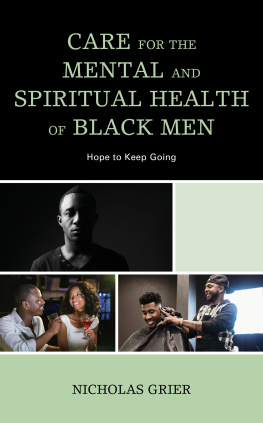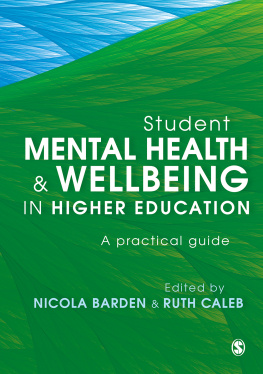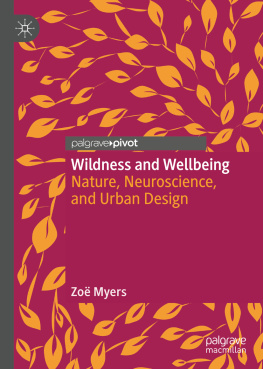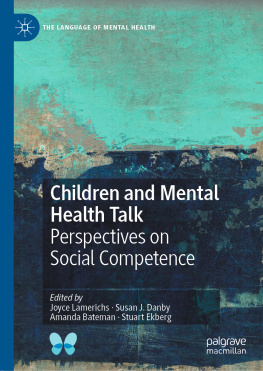MENTAL HEALTH AND WELLBEING
FOUNDATIONS OF MENTAL HEALTH PRACTICE
The Foundations of Mental Health Practice series offers a fresh approach to the field of mental health by exploring key areas and issues in mental health from a social, psychological and a biological perspective. Taking a multidisciplinary approach, the series is aimed at students and practitioners across the people professions- including student nurses, social workers, occupational therapists, psychiatrists, counsellors and psychologists.
Thurstine Basset worked as a community worker and social worker before becoming involved in mental health training and education in the 1980s. He is an independent training and development consultant and has experience of working with a number of universities, statutory and voluntary mental health organisations, service user and carer groups. He has published widely across the mental health training and education fields. In collaboration with Theo Stickley,he is a Co-editor of Learning about Mental Health Practice (Wiley 2008). He is also a Board Member for the Journal of Mental Health Training, Education and Practice.
Theo Stickley is Associate Professor of Mental Health Nursing at the University of Nottingham. He has authored and edited many books and journal articles about mental health. Each represents. He has authored and edited many books and journal articles about mental health. Each represents his interest in promoting a fair, just and genuinely caring way in which to think about and deliver mental health care. His area of research is promoting mental health through participatory arts and he advocates a creative approach to care delivery.
Available now:
Working with Dual Diagnosis: A Psychosocial Perspective by Darren Hill, William J Penson and Divine Charura
From Psychiatric Patient to Citizen Revisited by Liz Sayce
Models of Mental Health by Gavin Davidson, Jim Campbell, Ciaran Shannon and Ciaran Mulholland
Values and Ethics in Mental Health: An Exploration for Practice by Alastair Morgan, Anne Felton, Bill Fulford, Jaysree Kalathil and Gemma Stacey
Peer Support in Mental Health by Emma Watson and Sara Meddings
MENTAL HEALTH AND WELLBEING
INTERCULTURAL PERSPECTIVES
CHARLES WATTERS
Charles Watters, under exclusive licence to Springer Nature Limited 2020
All rights reserved. No reproduction, copy or transmission of this publication may be made without written permission.
No portion of this publication may be reproduced, copied or transmitted save with written permission or in accordance with the provisions of the Copyright, Designs and Patents Act 1988, or under the terms of any licence permitting limited copying issued by the Copyright Licensing Agency, Saffron House, 610 Kirby Street, London EC1N 8TS.
Any person who does any unauthorized act in relation to this publication may be liable to criminal prosecution and civil claims for damages.
The author has asserted his right to be identified as the author of this work in accordance with the Copyright, Designs and Patents Act 1988.
First published 2020 by
RED GLOBE PRESS
Red Globe Press in the UK is an imprint of Springer Nature Limited, registered in England, company number 785998, of 4 Crinan Street, London, N1 9XW.
Red Globe Press is a registered trademark in the United States, the United Kingdom, Europe and other countries.
ISBN 9781137610225 paperback
This book is printed on paper suitable for recycling and made from fully managed and sustained forest sources. Logging, pulping and manufacturing processes are expected to conform to the environmental regulations of the country of origin.
A catalogue record for this book is available from the British Library.
A catalog record for this book is available from the Library of Congress.
Contents
Acknowledgments
I wish to thank academic colleagues across many countries, in particular, the USA, UK, Brazil and Sweden for valuable conversations and insights that have stimulated my thinking while writing this book. There are many, well beyond the space available to me here. I particularly with to mention friends from the Society for Psychological Anthropology including Kristin Yarris, Whitney Duncan and Bridget Haas. I also wish to thank Kristin Yarris for a productive and insightful month spent at the University of Oregon in 2018 that give me opportunities to deepen reflection on many of the themes in the book and their resonance in different country contexts. Earlier visits to Brazil informed my thinking on religion, spirituality and wellbeing and the discussion of ex-voto offerings. I wish to thank friends from the University of Brasilia and the Universidade Catlica de Braslia, UCB, who facilitated visits and who have opened many doors including Francisco Martins, Maria Gondim and Marta de Freitas. I wish also to thank colleagues who contributed to summer symposiums offered by the Centre for Innovation and Research on Wellbeing at the University of Sussex including Jo Boyden from the Young Lives Project at the University of Oxford, Jules Pretty from the University of Essex, Dolf te Lintelo from the Institute of Development Studies, Dan Osborn from University College London, Kevin Fenton from Public Health England and Sussex colleagues Tish Marrable, Russell Whiting, Melissa Nolas, Elaine Sharland and David Orr. Particular thanks is due to researchers Emma Soye, Ines Meier and Anna Ridgewell for their significant contributions to research projects and symposia that have deepened debate and thinking in the field. I am also deeply indebted to a network of colleagues across Europe who I have worked with on themes relating to migration and wellbeing over more than two decades including Ilse Derluyn at the University of Ghent, Anders Hjern at University of Stockholm and Ketil Eide from the University of South Eastern Norway. While many have stimulated thinking and debate and offered generous support, errors, omissions and limitations in the text are entirely my responsibility.
A special debt of gratitude is owed to series editor Thurstine Bassett for his unflinching support of the project, including the review process and offering consistently insightful comments on the scope of the text. I wish also to thank Peter Hooper and Hannah Watson at Red Globe Press for excellent editorial support throughout the process and Vignesh Viswanathan for skilful management of technical production.
Finally, I wish to thank many members of my family who offered unstinting support; Tamara, who was always a voice of encouragement and practical support; children Joseph, Shane and Dominic and grandchildren Ayva and Leo. Joseph worked tirelessly in helping creating the index while Ayva and Leo offered valuable support in compiling the bibliography.
| 1 | Introduction Charles Watters |
A walk through any city or provincial town in, say, contemporary England, France, the USA or Brazil reveals the impact of heterogeneous ideas and services relating to mental health and wellbeing derived from many parts of the globe: Chinese and Ayurvedic medicine, yoga, reiki, tai chi, chi-kung, mindfulness, various forms of massage, sauna and spa treatments. Some of these practices are relatively recent, for example, the growth of mindfulness, in a secularised form outside of a Buddhist context, can be traced to the 1980s while yoga and tai-chi have been present for several decades more. Some practices were brought as part of a migratory process, for example, Chinese medicine was originally established to serve the needs of the Chinese and South East Asian diaspora just as Ayurvedic and Unani medicine travelled with migrants from Hindu India and the Islamic world. With rapidly accelerated migration and exchanges of ideas, treatments and understandings of the relationship between body and mind from many parts of the globe have become co-present with conventional forms of medicine and, in some notable cases, been incorporated into mainstream health systems.












